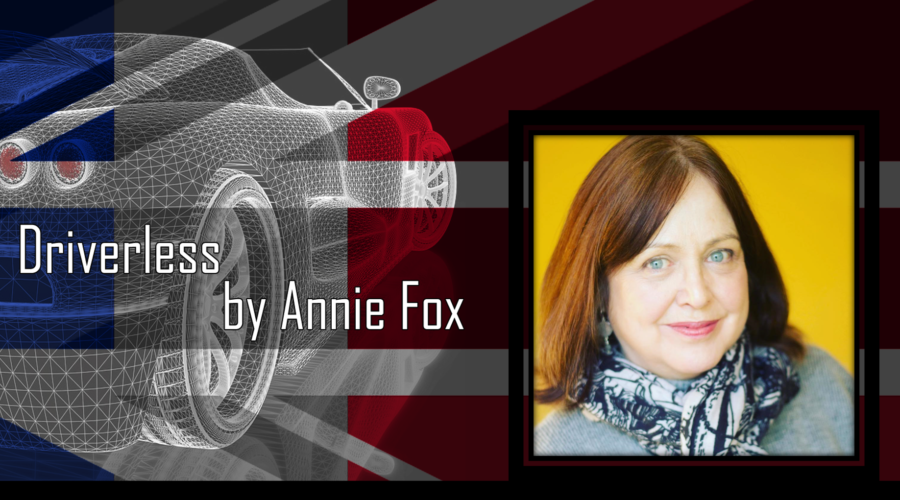Congratulations on winning the Little Wonder Radio Play Competition 2018! How do you feel? What was the biggest thing you learned?
Thank you – it’s been very exciting! The winner was announced on New Year’s Eve, so a positive ending to 2018. A big lesson in this process is the importance of finding the right medium for a story. DRIVERLESS was inspired by an exhibition about future technology at the V&A Museum where I spent a long time (probably too long!) in a driverless car simulator. I knew there was a story to be told and my first thought was to write it as a stage play for a Twilight Zone inspired evening. However cars on stage are usually portrayed with actors just plonked on chairs, which rarely really works. When I heard about the Little Wonder Radio Competition I adapted the draft stage piece for the radio which felt like its natural home.
Was this your first radio play? How do you find writing radio different from other medium?
This is my first radio play and it is a medium that really appeals to me. I have acted in radio plays, so had some idea of how powerful they can be, and I am also a big podcast fan. However there are challenges as well. There were moments when I had thought there should be long awkward silences between characters, but that doesn’t play well on the radio. Also I originally had very specific ideas about the songs that the characters listen to, but realised that with the expense of music rights that simply wouldn’t be possible. From my limited experience, writing for the radio seems very liberating in terms of subject matter and locations, but you also need to be pragmatic about the requirements of the form.
Little Wonder Competitions give feedback mid-way through the competition to Long-Listed candidates. What was it like getting feedback part way through? How did you use it?
Getting the feedback was one of the most valuable aspects of the competition – as all emerging writers know, quality feedback is like gold dust. I received five thoughtful, detailed reports from readers who were very perceptive about what I was aiming for and the demands of the genre. Reading so many reports gives you a strong steer about what is or isn’t working in your play. If something was unclear or unsatisfactory to more than one reader that definitely needed to be fixed. Keith gave firm guidance about cutting ‘faff’ from the beginning of the play and, as I edited I discovered that several sentences at the beginning could be replaced with the single word: ‘Gadgets!’
How did it feel hearing your play broadcast?
Exciting and a little nerve-wracking. I thought Amelia could be a tricky part to cast, but the moment I heard Stephanie Campion’s voice, I knew she would be fantastic. I enjoyed having an older character being at the centre of the piece and to hear the layers of her character, beyond dithering grandmother, gradually revealed. Keith had the tricky task of composing original music for it, so I was very intrigued to hear what he would create for those sequences. I liked the different atmosphere of the children’s party contrasting with the blossoming relationship between the car and Amelia. Even though I knew what was going to happen, the ending made me laugh.
What other work have you written? Where can we find it? And what are you working on at the moment?
I have written a one woman play called WOMAN CAUGHT UNAWARE which was one of three Heretic Voices winners. It received a professional production at the Arcola Theatre and is available in the Heretic Voices anthology from Nick Hern Books. It forms part of my one woman play trilogy, TROLL/DAMSEL/CRONE, about women at different ages.
I’m currently working on several projects, including a play about Hollywood in the 1920s and another about memory and social politics set in a university.
WOMAN CAUGHT UNAWARE can be found here, and all my books, including my OUP and Illuminate educational books, can be found here.
Finally, what advice would you give to anyone entering this year’s Little Wonder competitions?
Enter! As it’s a short play, it isn’t a huge time commitment and, if you haven’t previously written a radio play, it’s an excellent excuse to experiment with a new form. It’s especially good for that story idea that simply doesn’t work on stage because of its locations, its interiority or its technical demands. There is a lot of guidance on the About Writing website, such as the radio script template, which can save you a lot of time. I never regret the competitions I enter – only the ones I don’t.
BIO
Annie Fox is a California-born, London-based writer. She trained as an actor in New York and at the London Academy of Music and Dramatic Art, subsequently performing in theatre, films, television and radio. She has taught Drama, English and Media in London schools and regularly writes educational books for Oxford University Press and Illuminate Publishing. Her play, WOMAN CAUGHT UNAWARE, was a winner of the Heretic Voices competition, leading to a run at the Arcola Theatre in London and being published by Nick Hern Books in 2018. TROLL, part of her one woman play trilogy, TROLL/DAMSEL/CRONE, received a rehearsed reading at the Clapham Omnibus. Her short play, RUNNING ON THE SPOT, was selected for the Female Edit at Above the Arts to celebrate 100 years since women got the vote. DRIVERLESS is her first radio play and she is delighted that it won the Little Wonder Short Radio Play competition. On twitter she can be found @anniekathfox.



